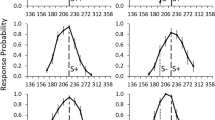Abstract
Several recent studies have explored what Michael (e.g., 1982) termed the value-altering effect and the behavior-altering effect of motivating operations. One aspect of the behavior-altering effect that has garnered no recent attention involves changes in stimulus control produced by motivating operations. To call attention to this aspect of the behavior-altering effect, we herein review 11 studies that are concerned with the influence of varying levels of food or water deprivation on stimulus generalization. These studies suggest that motivating operations influence stimulus control (a) by changing the evocative strength of not just an established discriminative stimulus, but also of stimuli that are physically similar to it; (b) by changing the range of stimuli that evoke the operant in question; and (c) by exerting these effects in a graded fashion. These findings are potentially of conceptual and applied significance, and it appears that further research examining how motivating operations alter stimulus control, including some studies suggested herein, is warranted.
Similar content being viewed by others
References
Brown, J. S. (1942). The generalization of approach responses as a function of stimulus intensity and strength of motivation. Journal of Comparative Psychology, 33, 209–226.
Clark, F. C. (1958). The effect of deprivation and frequency of reinforcement on variable-interval responding. Journal of the Experimental Analysis of Behavior, 1, 221–228.
Coate, W. B. (1964). Effects of deprivation on postdiscrimination stimulus generalization in the rat. Journal of Comparative and Physiological Psychology, 57, 134–138.
Gaiardi, M., Bartoletti, M., Bacchi, A., Gubellini, C., & Babbini, M. (1987). Increased sensitivity to the stimulus properties of morphine in food deprived rats. Pharmacology Biochemistry & Behavior, 26, 719–723.
Guttman, N., & Kalish, H. (1956). Discriminability and stimulus generalization. Journal of Experimental Psychology, 51, 79–88.
Healey, A. F. (1965). Compound stimuli, drive strength, and primary stimulus generalization. Journal of the Experimental Analysis of Behavior, 5, 536–538.
Hearst, E. (1962). Concurrent generalization gradients for food-controlled and shock-controlled behavior. Journal of the Experimental Analysis of Behavior, 5, 19–31.
Horner, R. H., Day, H. M., & Day, J. R. (1997). Using neutralizing routines to reduce problem behaviors. Journal of Applied Behavior Analysis, 30, 601–604.
Iwata, B. A., Smith, R. G., & Michael, J. (2000). Current research on the influence of establishing operations on behavior in applied settings. Journal of Applied Behavior Analysis, 33, 411–418.
Jenkins, W. O., Pascal, G. R., & Walker, R. W. (1958). Deprivation and generalization. Journal of Experimental Psychology, 56, 274–277.
Kalish, H. L., & Haber, A. (1965). Prediction of discrimination from generalization following variations in deprivation level. Journal of Comparative and Physiological Psychology, 60, 125–128.
Keller, F. S., & Schoenfeld, W. N. (1950). Principles of psychology. New York: Appleton-Century-Crofts.
Killeen, P. R., & Hall, S. S. (2001). The principal components of response strength. Journal of the Experimental Analysis of Behavior, 75, 111–134.
Laraway, S., Snycerski, S., Michael, J., & Poling, A. (2003). Motivating operations and terms to describe them: Some further refinements. Journal of Applied Behavior Analysis, 36, 407–414.
Li, M., Garner, H. R., Wessinger, W. D., & McMillan, D. E. (1995). Effects of food deprivation and satiation on sensitivity to the discriminative-stimulus effects of pentobarbital in pigeons and morphine in rats. Behavioural Pharmacology, 6, 724–731.
Lorenz, K. (1981). The foundations of ethology. New York: Springer-Verlag.
Massey, B. W., & McMillan, D. E. (1987). Effects of body weight on discriminative-stimulus control by phencyclidine in the pigeon. Journal of the Experimental Analysis of Behavior, 47, 233–239.
Michael, J. (1982). Distinguishing between discriminative and motivational functions of stimuli. Journal of the Experimental Analysis of Behavior, 37, 149–155.
Michael, J. (1993). Establishing operations. The Behavior Analyst, 16, 191–206.
Newman, J. R., & Grice, G. R. (1965). Stimulus generalization as a function of drive level, and the relation between two measures of response strength. Journal of Experimental Psychology, 69, 357–362.
Powell, R. W. (1971). Evidence of interaction between deprivation effects and stimulus control. Journal of the Experimental Analysis of Behavior, 16, 95–104.
Skinner, B. F. (1938). The behavior of organisms. New York: Appleton-Century-Crofts.
Skinner, B. F. (1953). Science and human behavior. New York: MacMillan.
Skinner, B. F. (1957). Verbal behavior. New York: Appleton-Century-Crofts.
Sundberg, M. L., & Michael, J. (2001). The benefits of Skinner’s analysis of verbal behavior for children with autism. Behavior Modification, 25, 698–724.
Thomas, D. R., & King, K. A. (1959). Stimulus generalization as a function of level of motivation. Journal of Experimental Psychology, 57, 323–328.
Tinbergen, N. (1948). Social releasers and the experimental method required for their study. Wilson Bulletin, 60, 6–51.
Author information
Authors and Affiliations
Corresponding author
Rights and permissions
About this article
Cite this article
Lotfizadeh, A.D., Edwards, T.L., Redner, R. et al. Motivating operations affect stimulus control: A largely overlooked phenomenon in discrimination learning. BEHAV ANALYST 35, 89–100 (2012). https://doi.org/10.1007/BF03392268
Published:
Issue Date:
DOI: https://doi.org/10.1007/BF03392268



